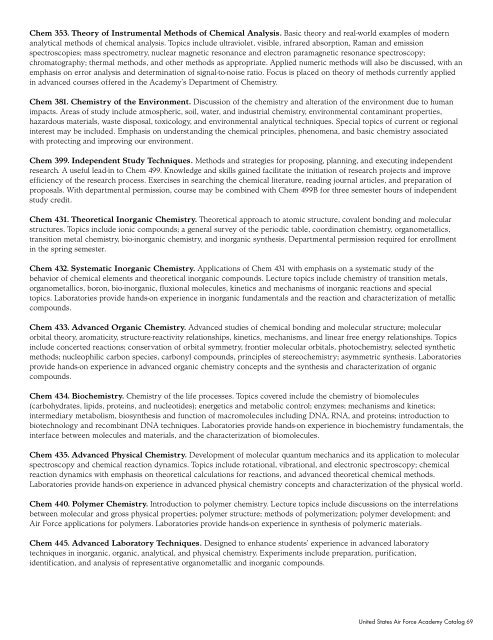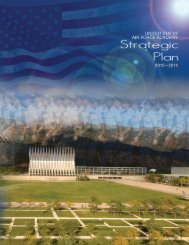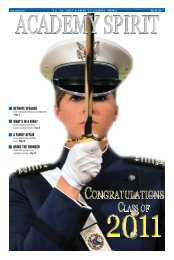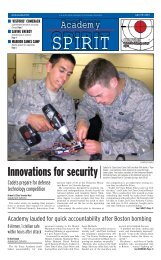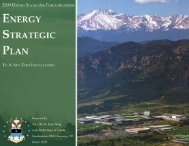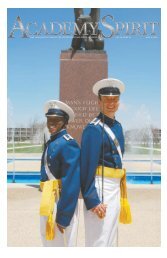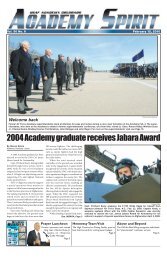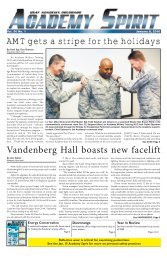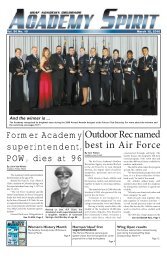2008-2009 Catalog - United States Air Force Academy
2008-2009 Catalog - United States Air Force Academy
2008-2009 Catalog - United States Air Force Academy
Create successful ePaper yourself
Turn your PDF publications into a flip-book with our unique Google optimized e-Paper software.
Chem 353. Theory of Instrumental Methods of Chemical Analysis. Basic theory and real-world examples of modern<br />
analytical methods of chemical analysis. Topics include ultraviolet, visible, infrared absorption, Raman and emission<br />
spectroscopies; mass spectrometry, nuclear magnetic resonance and electron paramagnetic resonance spectroscopy;<br />
chromatography; thermal methods, and other methods as appropriate. Applied numeric methods will also be discussed, with an<br />
emphasis on error analysis and determination of signal-to-noise ratio. Focus is placed on theory of methods currently applied<br />
in advanced courses offered in the <strong>Academy</strong>’s Department of Chemistry.<br />
Chem 381. Chemistry of the Environment. Discussion of the chemistry and alteration of the environment due to human<br />
impacts. Areas of study include atmospheric, soil, water, and industrial chemistry, environmental contaminant properties,<br />
hazardous materials, waste disposal, toxicology, and environmental analytical techniques. Special topics of current or regional<br />
interest may be included. Emphasis on understanding the chemical principles, phenomena, and basic chemistry associated<br />
with protecting and improving our environment.<br />
Chem 399. Independent Study Techniques. Methods and strategies for proposing, planning, and executing independent<br />
research. A useful lead-in to Chem 499. Knowledge and skills gained facilitate the initiation of research projects and improve<br />
efficiency of the research process. Exercises in searching the chemical literature, reading journal articles, and preparation of<br />
proposals. With departmental permission, course may be combined with Chem 499B for three semester hours of independent<br />
study credit.<br />
Chem 431. Theoretical Inorganic Chemistry. Theoretical approach to atomic structure, covalent bonding and molecular<br />
structures. Topics include ionic compounds; a general survey of the periodic table, coordination chemistry, organometallics,<br />
transition metal chemistry, bio-inorganic chemistry, and inorganic synthesis. Departmental permission required for enrollment<br />
in the spring semester.<br />
Chem 432. Systematic Inorganic Chemistry. Applications of Chem 431 with emphasis on a systematic study of the<br />
behavior of chemical elements and theoretical inorganic compounds. Lecture topics include chemistry of transition metals,<br />
organometallics, boron, bio-inorganic, fluxional molecules, kinetics and mechanisms of inorganic reactions and special<br />
topics. Laboratories provide hands-on experience in inorganic fundamentals and the reaction and characterization of metallic<br />
compounds.<br />
Chem 433. Advanced Organic Chemistry. Advanced studies of chemical bonding and molecular structure; molecular<br />
orbital theory, aromaticity, structure-reactivity relationships, kinetics, mechanisms, and linear free energy relationships. Topics<br />
include concerted reactions; conservation of orbital symmetry, frontier molecular orbitals, photochemistry, selected synthetic<br />
methods; nucleophilic carbon species, carbonyl compounds, principles of stereochemistry; asymmetric synthesis. Laboratories<br />
provide hands-on experience in advanced organic chemistry concepts and the synthesis and characterization of organic<br />
compounds.<br />
Chem 434. Biochemistry. Chemistry of the life processes. Topics covered include the chemistry of biomolecules<br />
(carbohydrates, lipids, proteins, and nucleotides); energetics and metabolic control; enzymes; mechanisms and kinetics;<br />
intermediary metabolism, biosynthesis and function of macromolecules including DNA, RNA, and proteins; introduction to<br />
biotechnology and recombinant DNA techniques. Laboratories provide hands-on experience in biochemistry fundamentals, the<br />
interface between molecules and materials, and the characterization of biomolecules.<br />
Chem 435. Advanced Physical Chemistry. Development of molecular quantum mechanics and its application to molecular<br />
spectroscopy and chemical reaction dynamics. Topics include rotational, vibrational, and electronic spectroscopy; chemical<br />
reaction dynamics with emphasis on theoretical calculations for reactions, and advanced theoretical chemical methods.<br />
Laboratories provide hands-on experience in advanced physical chemistry concepts and characterization of the physical world.<br />
Chem 440. Polymer Chemistry. Introduction to polymer chemistry. Lecture topics include discussions on the interrelations<br />
between molecular and gross physical properties; polymer structure; methods of polymerization; polymer development; and<br />
<strong>Air</strong> <strong>Force</strong> applications for polymers. Laboratories provide hands-on experience in synthesis of polymeric materials.<br />
Chem 445. Advanced Laboratory Techniques. Designed to enhance students’ experience in advanced laboratory<br />
techniques in inorganic, organic, analytical, and physical chemistry. Experiments include preparation, purification,<br />
identification, and analysis of representative organometallic and inorganic compounds.<br />
<strong>United</strong> <strong>States</strong> <strong>Air</strong> <strong>Force</strong> <strong>Academy</strong> <strong>Catalog</strong> 69


